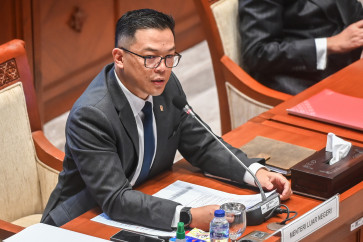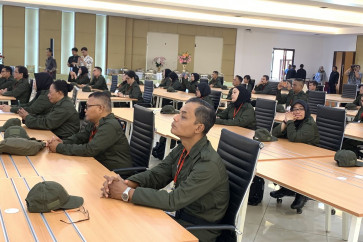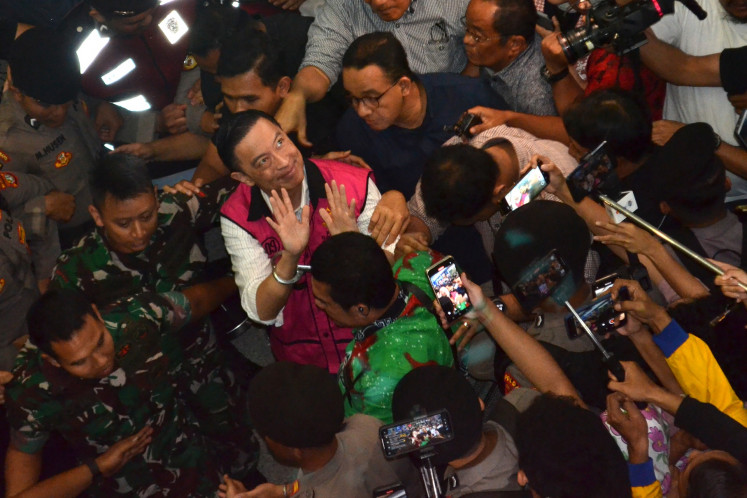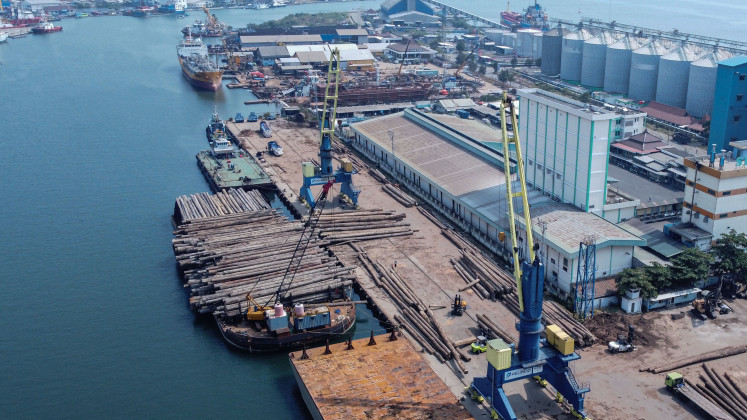Popular Reads
Top Results
Can't find what you're looking for?
View all search resultsPopular Reads
Top Results
Can't find what you're looking for?
View all search resultsRegional autonomy: Strengthening the province
After a month of recess, the House of Representatives will restart the debate on the draft amendment of Local Autonomy Law No
Change text size
Gift Premium Articles
to Anyone
A
fter a month of recess, the House of Representatives will restart the debate on the draft amendment of Local Autonomy Law No. 32/2004. So far, one of the contentious issues is the status of a province within the national administration and the approach it uses.
Thirteen years of decentralization has resulted in dysfunction of the governor's post and disappearance of the province in our regional government structure.
Decentralization effectiveness has been weakening since the province ' as the authority level assigned to coordinate regions ' is weak. In fact, full autonomy at the regency/municipality level is dangerous when the governor lacks controlling power.
It should be admitted that the province as an administrative area and the governor's status as representations of the central government in the framework of deconcentration are simply jargon.
The rules for the model of integrated field administration (IFA) that unites working areas of vertical institutions with province, or integrated prefectorial system (IPS) that places regencies as part of province, is not accommodated appropriately. Therefore, its implementation in the field is weak and is not clear-cut.
In this autonomy era, the regent/mayor does not view his/her area as part of a province; they even deem the governor a subordinate.
The head of a regency/municipality directly communicates with the central government, in the same manner as the central government officials who often by-pass the province to deal with the regency/municipality.
Amendment of the Local Autonomy Law, therefore, sets the momentum to restore the governor's position and the province's roles.
There are problems with the relationship between government units, but they have different views concerning the root causes, the strengthening approach and the strengthening scale.
The draft amendment views the governor in the framework of the province as both an autonomous region and an administrative area. To strengthen the province as an autonomous region, it takes over regions' authorities in forestry, fisheries, estate and mining.
To empower the province as an administrative area, the draft revision asserts the governor's position as representation of Jakarta through its jobs to: (i) conduct general task/tutelage power in relations with Pancasila ideology application, unity/integrity of the nation, harmony among members of different religions, etc.; (ii) develop, control, coordinate, facilitate, evaluate and supervise regencies/municipalities as well as evaluate regional ordinances (regional budget, spatial plan, development plan, local tax and levies) and control regional ordinances.
To effectively carry out those tasks, a governor will be given the authority to approve the formation of vertical institutions, control upon regional regulations, provide reward and punishment to regents/mayors, etc. Additionally, at the administrative level, arrangement for administrative support, i.e. assignment of provincial officials like secretary and deputies to under the governor will be defined.
There are, however, some principle weaknesses in the draft revision of the local government law as follows.
First, the plan to strengthen the province will be a blunder if its scope is not limited to its status as administrative area but is extended too far as an autonomous region.
Any plan to 'withdraw' some authorities awarded to regencies/municipalities will only damage the construction of the province as a government entity that has originally been constructed to overseeing cross-region matters in the form of managerial authority 'to coordinate', which is not an authority 'to arrange' and 'to conduct'.
In my opinion, in principle, almost all sector matters have a locality dimension that is strong in its scale/area, span of control and accountability.
Regarding the extent of the impact (externalities) that could be cross-area, it should only ask for the presence of province in the form of an authority to coordinate (deconcentration) or, at the most, to make it concurrent (partial decentralization), and not to arrange and even less to manage it as an exclusive authority that is entirely conducted in the framework of (absolute) decentralization principle.
In fact, it is observed that so far loyalty of the regency/city to the province is influenced by mix-up of the province's status and the governor's double jobs.
In addition, the bid to strengthen the province as an autonomous unit only indicates an effort to introduce partial recentralization or micro-centralization at the provincial level, rather than to empower it.
Second, the strengthening of the province as an administrative area and the governor's position as a
representative of Jakarta stipulated in the draft amendment is a half-baked initiative.
The draft revision shows weaknesses in the arrangement of key elements such as authority scale and basis, synchronisation of authorities' arrangement and institutional arrangement.
Regarding 'the right to make a decision', the governor's authority should be final and authoritative in executive circles, except if objection arises, which should be resolved through a judicial review.
From the legal aspect, the policy shall be spelled out in the form of a gubernatorial decree. Concerning bylaws the governor is authorized to supervise but the authority to revoke is in the hands of the President (Law No. 28/2009).
In the wake of the governor's dysfunction, hopes for the amendment of the regional government law to enable the governor to coordinate regional governments and their policies are obviously difficult to materialize.
Without an authority attached to the governmental structure, a governor's power will rely on his/her individual leadership capacity, instead of the foundation of an institutionalized and sustainable government.
Moreover, until today a governor has neither a support team nor special budget to carry out his/her duty as representation of Jakarta.
Now that the deliberation of the draft revision at the House is still underway, hopes for fundamental strengthening of the province and governor remain there.
The writer is executive director of Regional Autonomy Watch (KPPOD), Jakarta.










